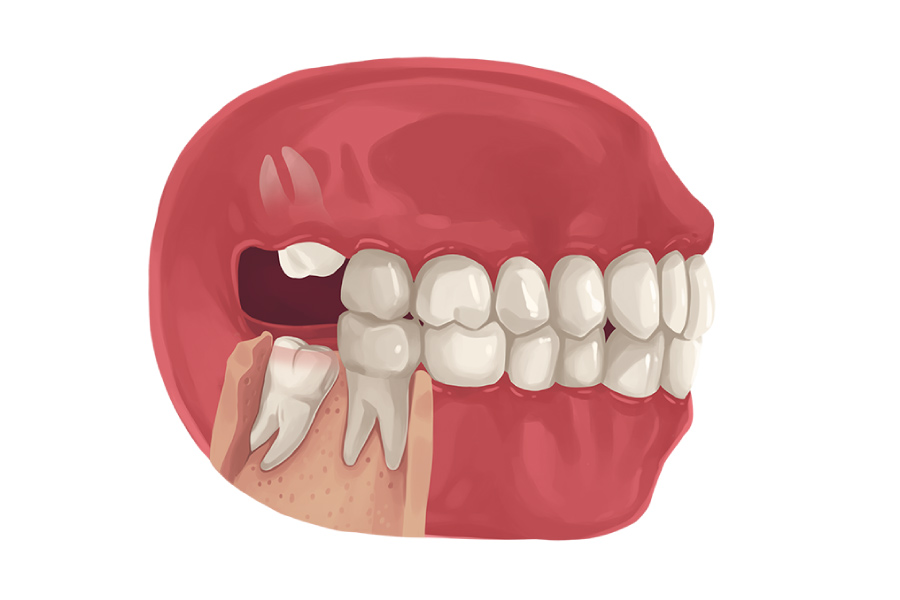The Comprehensive Benefits of Wisdom Teeth Removal
Wisdom teeth, also known as third molars, often make a grand entrance in our late teens or early twenties. While they can be a source of discomfort, the significance of wisdom teeth removal goes beyond mere pain relief. This introductory section aims to shed light on why this dental procedure is crucial for maintaining optimal oral health.

Signs and Symptoms: Recognizing the Need for Wisdom Teeth Extraction
Common Symptoms and Queries
Persistent Pain: Uncover why persistent pain around the back of the mouth may indicate a need for wisdom teeth removal.
Swelling and Redness: Explore how swelling and redness in the gum area may be symptomatic of impacted wisdom teeth.
Difficulty in Jaw Movement: Address concerns about difficulty in jaw movement and its correlation with wisdom teeth issues.
Tooth Crowding: Explain how wisdom teeth can lead to tooth crowding, affecting the overall alignment of the dental arch.
Natural Language Processing for User Engagement
Understanding the signs and symptoms is crucial. If you’re experiencing persistent pain, swelling, or difficulty in jaw movement, your wisdom teeth might be the culprit. Let’s explore the common indicators that suggest it’s time to consider wisdom teeth removal for a healthier, pain-free smile.
Benefits Beyond Pain Relief: Comprehensive Oral Health Improvements
Holistic Oral Health Enhancement
Preventing Gum Inflammation: Discuss how removing impacted wisdom teeth can prevent gum inflammation and reduce the risk of infections.
Maintaining Oral Hygiene: Emphasize the positive impact on oral hygiene by eliminating potential spaces where food particles can get trapped.
Reducing the Risk of Cavities: Explore how wisdom teeth removal decreases the risk of cavities in hard-to-reach areas.
Natural Language Integration
Beyond pain relief, wisdom teeth removal offers a holistic enhancement to your oral health. Discover how this procedure not only alleviates discomfort but also plays a pivotal role in preventing gum inflammation, maintaining impeccable oral hygiene, and reducing the risk of cavities. Let’s delve into the comprehensive benefits awaiting those considering wisdom teeth extraction.
The Procedure Unveiled: What to Expect During Wisdom Teeth Removal
Detailed Overview
Anesthesia Options: Discuss the types of anesthesia used during the procedure and their respective benefits.
Surgical Techniques: Explain common surgical techniques employed in wisdom teeth removal.
Expected Duration: Provide an estimate of the typical duration of a wisdom teeth removal procedure.
Recovery Room Procedures: Outline what patients can expect in the recovery room post-extraction.
Natural Language Guidance
Curious about what happens during wisdom teeth removal? Let’s unveil the procedure. We’ll explore the different anesthesia options, surgical techniques, and what to expect in terms of duration and recovery. Understanding the process can alleviate concerns and empower you to approach the procedure with confidence.
Post-Extraction Care: Ensuring a Smooth Recovery Process
Guidance for Optimal Recovery
Managing Discomfort: Provide tips for managing post-extraction discomfort.
Dietary Recommendations: Offer guidance on suitable foods during the recovery period.
Oral Hygiene Practices: Outline optimal oral hygiene practices to prevent complications.
Follow-up Appointments: Stress the importance of attending follow-up appointments for a smooth recovery.
Natural Language for User-Friendly Guidance
The journey doesn’t end with the procedure. Let’s navigate the post-extraction phase together. From managing discomfort to dietary recommendations and essential oral hygiene practices, this section provides user-friendly guidance for a smooth recovery. Plus, the importance of follow-up appointments to ensure your recovery is on track.
Frequently Asked Questions (FAQs)
1. What are the primary reasons for wisdom teeth removal?
Wisdom teeth are often removed to prevent potential complications such as impaction, cyst formation, and damage to adjacent teeth, ensuring long-term oral health.
2. Is wisdom teeth removal a painful procedure?
The procedure itself is performed under anesthesia, ensuring patients do not feel pain during the process. Post-extraction, discomfort is manageable with proper care and medications.
3. At what age should wisdom teeth be removed?
The ideal age for removal is typically in the late teens or early twenties before complications arise. However, the timeline may vary for each individual based on their dental development.
4. How long does the recovery process take after wisdom teeth removal?
Recovery duration varies, but most individuals can resume normal activities within a few days. Following post-extraction care guidelines is crucial for a smooth recovery.
5. Are there alternatives to wisdom teeth removal?
In some cases, monitoring and addressing specific concerns may be an alternative. However, consulting with a dental professional is essential to determine the most suitable approach.
6. Can impacted wisdom teeth cause health issues beyond oral health?
Yes, impacted wisdom teeth can lead to various health issues, including sinus problems and headaches. Removal helps prevent these complications.
7. How can I manage pain and discomfort after wisdom teeth removal?
Pain and discomfort can be managed with prescribed medications, ice packs, and following post-extraction care instructions for optimal recovery.
8. Will removing wisdom teeth affect my bite alignment?
Removing wisdom teeth can positively impact bite alignment by preventing misalignment issues that may arise due to the presence of these third molars.
9. Is wisdom teeth removal covered by dental insurance?
In many cases, dental insurance covers a portion of the cost of wisdom teeth removal, especially if it is deemed medically necessary. Check with your insurance provider for details.
10. Can I drive myself home after wisdom teeth removal?
Due to the effects of anesthesia, it’s recommended to have someone accompany you or arrange for transportation after the procedure. Driving immediately after may not be safe.
Conclusion:
In conclusion, embracing the transformative benefits of wisdom teeth removal is not just about pain relief—it’s a holistic investment in your oral wellness. From proactive measures to comprehensive improvements, make informed decisions for a healthier, pain-free smile. Your journey toward optimal oral health begins with the transformative benefits of wisdom teeth removal.




